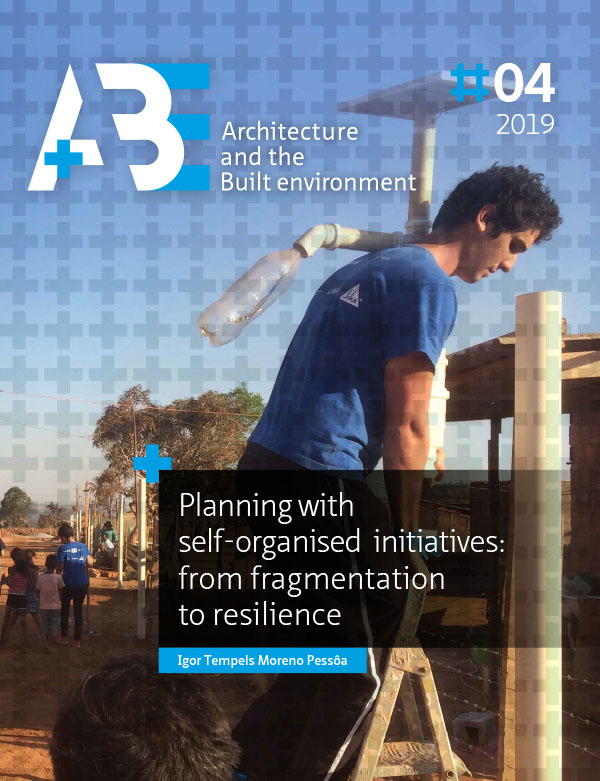Planning education with self‑organised initiatives
a case study of societal impact using online education
Keywords:
MOOC, urban planning education, Global SouthAbstract
Massive Open Online Courses (MOOC) are becoming a popular educational tool on different disciplines. Urban planning education is no exception and new MOOCs are being release every year. Nevertheless, it is still not clear how this new learning experience is being developed, delivered and impacting planning education. This article sheds some light on this issue using the case of the Rethink the City MOOC organised by the Faculty of Architecture and the Built Environment of TU Delft. The course received the AESOP Excellence on Teaching award in 2017 and can serve as an example of how planning education is facing these changes. The article briefly introduces the course and develops on the challenges and results of it. Based on the course team experience on preparing and delivering the course, the article aims to contribute to the debate about online education and to support fellow academics involved on the creation of new MOOCs.
References
Frank, A.I., I. Mironowicz, J. Lourenço, T. Franchini, P. Ache, M. Finka, B. Scholl and A. Grams (2014) Educating planners in Europe: A review of 21st century study programmes, Progress in Planning 91(Supplement C), 30-94.
Graham, M., McLean, J., Read, A., Suchet-Pearson, S., Viner, V. (2017) Flipping and still learning: experiences of a flipped classroom approach for a third-year undergraduate human geography course, Journal of Geography in Higher Education, 41 (3), 403-417.
GSSC. (2015). Global South Studies Center Cologne, online http://gssc.uni-koeln.de/ (accessed on 05/102017).
Healey, P. (2012) The universal and the contingent: Some reflections on the transnational flow of planning ideas and practices, Planning Theory 11(2), 188-207.
Healey, P. (2013) Circuits of Knowledge and Techniques: The Transnational Flow of Planning Ideas and Practices, International Journal of Urban and Regional Research 37(5), 1510-26.
Hew, K. F., and Cheung, W. S. (2014). Students’ and instructors’ use of massive open online courses (MOOCs): Motivations and challenges. Educational Research Review, 12(Supplement C), 45-58. doi: https://doi. org/10.1016/j.edurev.2014.05.001
Home, R. (2014). Shaping cities of the global south: Legal histories of planning and colonialism. In S. Parnell and S. Oldfield (eds.), The routledge handbook on cities of the global south, Routledge, Abingdon, 75-85.
Miraftab, F. (2016). Insurgent Planning: Situating Radical Planning in the Global South Readings in Planning Theory: Fourth Edition (pp. 480-498).
Nelson, J., van Valkenburg, W. and Dopper, S. (2016). Re-Imaging Learning Environments . Proceedings of the European Distance and E-Learning Network. Budapest, 14-17 June. ISBN 978-615-5511-10-3
Kunzmann, K.R. and L. Yuan (2014) Educating Planners from China in Europe, disP - The Planning Review 50(4), 66-70.
Kurucay, M., and Inan, F. A. (2017). Examining the effects of learner-learner interactions on satisfaction and learning in an online undergraduate course. Computers & Education, 115(Supplement C), 20-37. doi: https://doi.org/10.1016/j.compedu.2017.06.010
Pessoa, I. M., Taşan-Kok, T. and Altes, W. K. (2016). “Brazilian urban porosity: treat or threat?” Proceedings of the Institution of Civil Engineers -Urban Design and Planning 169(2): 47-55.
Paasi, A. (2005) Globalisation, academic capitalism, and the uneven geographies of international journal publishing spaces, Environment and Planning A, 37 (5), 769-789
Ratnayake, R. and A. Butt (2018) Encounters with the unfamiliar: international planning education, International Planning Studies, 23 (1), p. 51-64.
Roy, A. (2011). Commentary: Placing planning in the world-transnationalism as practice and critique. Journal of Planning Education and Research, 31(4), 406-415. doi: 10.1177/0739456X11405060
Roy, A. (2016). Who’s Afraid of Postcolonial Theory? International Journal of Urban and Regional Research, 40(1), 200-209. doi: 10.1111/1468-2427.12274
Rosier, J., C. Slade, T. Perkins, C. Baldwin, E. Coiacetto, T. Budge and A. Harwood (2016) The benefits of embedding experiential learning in the education of planners, Planning Practice & Research 31(5), 486-99.
Shapiro, H. B., Lee, C. H., Wyman Roth, N. E., Li, K., Çetinkaya-Rundel, M., and Canelas, D. A. (2017). Understanding the massive open online course (MOOC) student experience: An examination of attitudes, motivations, and barriers. Computers & Education, 110(Supplement C), 35-50. doi: https://doi.org/10.1016/j. compedu.2017.03.003
Siame, G. (2016) The Value and Dynamics of Community-Based Studio Projects in Planning Education in the Global South, Berkeley Planning Journal 28(1), 40-67.
UN (2015) World Urbanization Prospects: The 2014 Revision, Department of Economic and Social Affairs of the United Nations, New York, United Nations, New York, https://esa.un.org/unpd/wup/Publications/Files/ WUP2014-Report.pdf (accessed 05/10/2017)
Vergara, L. M., Gruis, V., & van der Flier, K. (2019). Understanding Housing Management by Low-income Homeowners: Technical, Organisational and Sociocultural Challenges in Chilean Condominium Housing. Buildings, 9(3), 65. doi: doi:10.3390/buildings9030065
Watson, V. (2016) Planning mono-culture or planning difference? Planning Theory and Practice 17(4), 663-67.
Watson, V. (2016). Seeing from the South: Refocusing Urban Planning on the Globe’s Central Urban Issues Readings in Planning Theory: Fourth Edition (pp. 540-560).
GSSC. (2015). Global South Studies Center Cologne.

